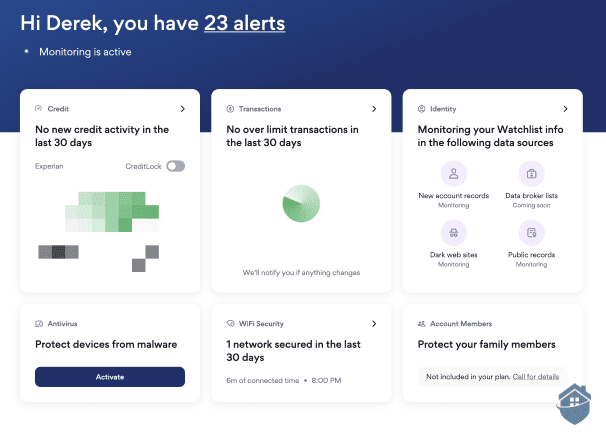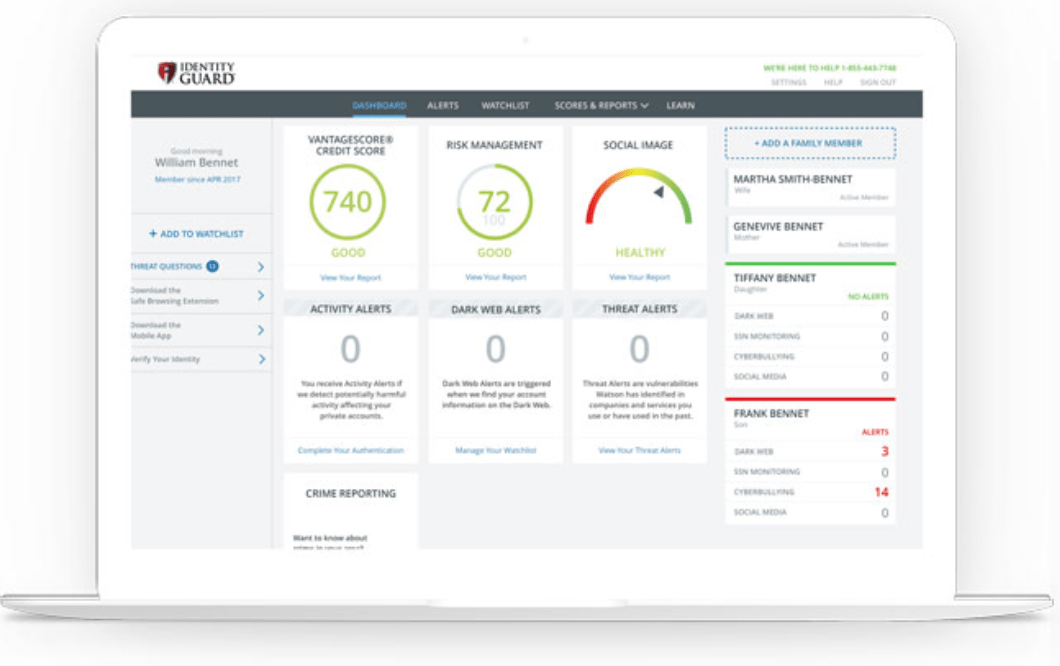The two are pretty tied in terms of value, but we ultimately found Aura to be the better choice. Its pricing structure is more straightforward than LifeLock’s subscriptions, and Aura is also more affordable. Plus, all of its subscriptions come with the same identity theft protection and credit monitoring features, which is very convenient. Also, LifeLock’s extra security tools are only available via a bundled subscription that sadly only includes limited identity theft protection.
We recommend checking out the rest of our comparison guide to see how the two services differ from each other.
Aura vs LifeLock: The Main Takeaway
LifeLock and Aura both provide strong identity theft protection, but we like Aura more. While LifeLock provides tons of useful identity theft protection and credit monitoring features, its prices are somewhat steep (especially when they renew at a new rate after one year). What’s more, its pricing structure is pretty confusing.
Plus, we don’t like how only the most expensive subscription tier comes with three-bureau monitoring. And while LifeLock has extra tools like an antivirus, a VPN, and parental controls, they’re only available via a separate subscription that sadly only has limited identity theft protection.
Aura is more affordable, and also more convenient since all subscriptions come with the same identity theft and credit protection features (including triple-bureau monitoring). The identity theft protection subscriptions also come with an antivirus, a VPN, a password manager, and extra security tools that you don’t get with LifeLock (like a data removal service).
Aura & LifeLock Prices
Aura and LifeLock both provide great value, but we think Aura comes out on top simply because it’s much more affordable.
Aura

Aura Dashboard
Aura makes it easy to choose a plan that suits you and your family. Here’s a quick look at Aura’s subscriptions:
| Aura Subscription | Monthly Cost | Annual Cost |
|---|---|---|
| Kids | $13/month | $120/year ($10/month) |
| Individual | $15/month | $144/year ($12/month) |
| Couple | $29/month | $264/year ($22/month) |
| Family | $50/month | $384/year ($32/month) |
The Kids subscription only comes with parental controls and other tools for keeping kids safe online. Plus, it lets you monitor an unlimited number of kids and devices. But it doesn’t provide any type of identity theft protection or credit monitoring.
The Individual, Couple, and Family subscriptions all come with the same identity theft and credit protection tools. The only difference is that the Family subscription also includes all features available in the Kids plan. Also, each subscription covers a different number of users — Individual covers one adult, Couple covers two adults, and Family covers five adults and an unlimited number of children.
Aura has affordable prices, but keep in mind the subscriptions renew at a different rate after one year. You’ll generally end up paying more with a monthly plan, so we strongly recommend getting a yearly plan to enjoy better savings. But even after the prices renew, you’ll still very likely end up paying less than you would for LifeLock (whose prices also renew after one year).
Aura also comes with a free 14-day trial for all of its subscriptions, which provides enough time to see if the service is right for you. Plus, if you get an annual plan, you’ll also be covered by a 60-day money-back guarantee.
>>Read More: Aura Identity Theft Protection Review
LifeLock

Norton LifeLock Dashboard
LifeLock has tiered subscriptions with plans tailored for individuals, couples, and families. But it also has a subscription that’s bundled with some of Norton’s other services. So, its pricing can be a bit confusing.
To keep things simple, let’s start with an overview of the main LifeLock subscriptions:
| LifeLock Standard | LifLock Advantage | LifeLock Ultimate Plus | |
|---|---|---|---|
| Individual Plan (Monthly Cost) | $11.99/month | $22.99/month | $34.99/month |
| Individual Plan (Annual Cost) | $89.99/year ($7.50/month) | $179.88/year ($14.99/month) | $239.99/year ($19.99/month) |
| Family Plan 2 Adults (Monthly Cost) | $23.99/month | $45.99/month | $69.99/month |
| Family Plan 2 Adults (Annual Cost) | $148.87/year ($12.49/month) | $287.88/year ($23.99/month) | $395.88/year ($32.99/month) |
| Family Plan 2 Adults + 5 Kids (Monthly Cost) | $35.99/month | $57.99/month | $79.99/month |
| Family Plan 2 Adults + 5 Kids (Annual Cost) | $221.87/year ($18.49/month) | $359.88/year ($29.99/month) | $467.88/year ($38.99/month) |
In addition to those subscriptions, there’s also the Norton 350 with LifeLock Select Plus subscription. This plan provides limited identity theft protection and credit monitoring, as well as access to an antivirus, password manager, VPN, and parental controls. It’s only available via an annual plan that costs $99.99/year. Aura also has similar extra security features, but it conveniently includes them on all of its subscriptions, so you don’t need to purchase a separate one.
Like Aura, all of LifeLock’s plans renew at a different rate after one year. We don’t consider this a huge issue, but we’re not fans of how LifeLock’s price jumps are much bigger than Aura’s renewal rates.
There’s a 30-day free trial for all LifeLock-only subscriptions, and a 7-day free trial for the Norton 360 with LifeLock Select Plus subscription. The service backs all annual plans with a 60-day money-back guarantee, and all monthly plans with a 14-day money-back guarantee.
>>Learn More: LifeLock Review: A Hands-On Test in 2025
Aura & LifeLock Feature Comparison
Aura and LifeLock are both very feature-rich. We’ll go over how they handle identity theft protection, credit monitoring, extra security features, and child protection in this section.
Identity Protection
It’s pretty much a draw between the two services since they both have essential and extra identity theft protection features. Here’s a quick look at some of the features Aura and LifeLock offer:
| Identity Theft Feature | Aura | LifeLock |
|---|---|---|
| Identity Theft Insurance | Yes (up to $1 million per user) | Yes (up to $3 million per user) |
| Identity Restoration | Yes | Yes |
| Dark Web Monitoring | Yes | Yes |
| Breach Notifications | Yes | Yes |
| Personal Information & SSN Monitoring | Yes | Yes |
| Home Title Monitoring | Yes | Yes |
| Criminal Records Monitoring | Yes | Yes |
Both services provide great identity theft insurance. We do have note that LifeLock’s insurance is more comprehensive. Not only does it go up to $3 million per user, but its Family Plan (2 Adults + 5 Kids) even offers identity theft insurance for children (up to $1.05 million per child) — this is something very few identity theft protection services offer.
On top of all features mentioned in the above table, Aura and LifeLock also come with more tools for keeping your identity safe. They also have USPS address change monitoring, lost/stolen wallet protection, and ID verification monitoring. LifeLock also has a few extras that Aura doesn’t, like social media monitoring, phone takeover monitoring, and file-sharing network searches (this means LifeLock looks for personal data leaks on file-sharing networks).
We do think that Aura is more convenient since it includes access to all identity theft protection features on all of its subscriptions. LifeLock’s subscriptions, however, are tiered — for example, the cheapest subscription (Standard) doesn’t come with phone takeover monitoring and file-sharing network searches.
Credit Monitoring
Both Aura and LifeLock come with essential credit monitoring and protection features. Here’s what you get with each one:
| Credit Monitoring Feature | Aura | LifeLock |
|---|---|---|
| Transaction Monitoring | Yes | Yes |
| Bank Account Monitoring | Yes | Yes |
| 3-Bureau Credit Monitoring | Yes | Yes (only on Ultimate Plus plan) |
| Monthly Credit Score | Yes | Yes |
| 401(k) & Investment Account Monitoring | Yes | Yes (only on Ultimate Plus plan) |
| Credit Lock | Yes | Yes |
It’s great that both services provide triple-bureau monitoring, but Aura definitely comes out on top. That’s because all of its subscriptions include triple-bureau monitoring. With LifeLock, only the most expensive subscription (Ultimate Plus) offers triple-bureau monitoring — the other plans only provide one-bureau monitoring. And LifeLock’s Ultimate Plus subscription is much more expensive than all of Aura’s subscriptions.
FYI: Three-bureau credit monitoring is the gold standard for identity theft protection services. It provides alerts of any changes that occur on reports from Experian, TransUnion, and Equifax. Check out our roundup of the best credit monitoring services to see which providers meet our standards.
Once more, Aura gets bonus points for providing access to all credit monitoring and protection features on all of its subscriptions. With LifeLock, you’ll need to pay steeper prices to get access to more features. For example, credit reports and scores are only available on the Advantage and Ultimate Plus subscriptions, and 401(k) and investment account monitoring is only available on the Ultimate Plus plan.
Additional Security Features
Aura and LifeLock both provide access to extra security features. This includes an antivirus and a password manager. The antivirus protects your device against malware infections, and the password manager secures your logins. Each service also has a VPN, which secures your internet traffic and hides your real-time location by masking your IP address.
But we think Aura provides a better deal. It includes these security tools on all of its subscriptions. With LifeLock, however, you only get these tools via the Norton 360 with LifeLock Select Plus. Unfortunately, that subscription comes with very limited identity theft protection — for example, it only has one-bureau monitoring and up to $25,000 in stolen funds reimbursement.
FYI: You could also just get a high-tier LifeLock subscription, and sign up for a separate Norton subscription that includes its antivirus, password manager, and VPN. But doing this will be very expensive, so Aura is still the better pick.
On top of that, Aura also comes with other security features:
- Email Alias. Lets you create and use a fake email when you sign up on certain websites. This protects you from spam emails and scams.
- Data removal. Aura requests the removal of your data from data broker databases. Data brokers add your personal data to those databases, and then sell it to advertisers.
- Spam call and message protection. Aura uses AI to protect you from robocalls and phone scams. This tool is included for free with the Family subscription, and is available as a paid add-on on the other subscriptions.
Child Protection
Both services are among the best identity theft protection services for children on the market. Aura and LifeLock both scan billions of public records to determine if someone else uses your child’s SSN. In addition, they both offer help with freezing your child’s credit.
They also both provide access to parental controls, which let you filter content and sites, schedule screen time, and monitor device locations. But Aura is more convenient since it includes the parental controls in its Family subscription. With LifeLock, parental controls are only available via the Norton 360 with LifeLock Select Plus subscription, which has very limited identity theft protection.
Aura also has some extra child protection features that you don’t get with LifeLock:
- Safe Gaming. Receive alerts when kids are threatened via in-game voice or text messages on over 200 popular PC games.
- Sex offender geo-alerts. Aura alerts you about new or known sex offenders that are present within a one mile radius of your address.
>> Read About: 5 Child Identity Theft Statistics Every Parent Should Know
Comparing Aura & LifeLock’s Privacy Policies
To keep you safe, identity theft protection services need to collect a lot of your personal information. But before we started handing it over, we looked into what Aura and Norton do with it.
Aura
You won’t need a lawyer present to decipher Aura’s privacy policy. It’s presented well and easy to read.
But one line that stands out is that Aura can use your data to promote co-branded offers with partners. This may include contacting you about services from companies it thinks you might be interested in. However, it restricts the usage of your details to communicating, evaluating, and improving offers.
FYI: While Aura may share your data with partners, it clearly states in its privacy policy that it does not sell your information as defined by the Consumer Data Protection Act (CDPA).
This line didn’t surprise us, as some of Aura’s services are white labeled. Its VPN is a reskin of Hotspot Shield, and Circle powers the parental controls. Even the gaming and cyberbullying alerts are backed by ProtectMe by Kidas. So, some of your details are shared with these partners to power them.
LifeLock
LifeLock’s privacy policy is very straightforward about what data the service collects. This includes account data, device data, identity data, service data, and more. The privacy policy makes it clear that LifeLock only uses this data to authenticate your account, deliver you the services you have selected, communicate with you, troubleshoot issues, and improve the LifeLock service.
Since LifeLock is a Norton product, we also checked out Norton’s general privacy policy. We found that the company shares your data with:
- Data analytics providers
- Payment processors
- Public authorities and legal proceedings
- Social media and internet platforms
- Restoration services
But none of these raised alarm bells for us, as most identity theft protection services partner with third-party providers to improve their services.
Did You Know? LifeLock experienced a data breach in December 2022.3 It didn’t affect other Norton products, but customers using the password manager had financial and personal information leaked.
FAQs
- Is Aura a good identity theft protection solution?
Aura offers an extensive list of identity theft protection and credit monitoring features. And you get access to them no matter what subscription you pick. What’s more, it also comes with extra security tools, like an antivirus and a VPN.
- What is the downside of LifeLock?
LifeLock only has triple-bureau monitoring on the most expensive subscription. It also has too many plans, making it confusing to pick the right one for your needs. The price of the packages also increases significantly in the second year.
- Has Aura been hacked?
As of this time of writing, Aura has not had any hacks or reported breaches.
- Can LifeLock be trusted?
Yes, as its privacy policy makes it clear it doesn’t compromise your personal data. Plus, the service also offers great identity theft protection features.
- Does Aura sell your data?
Aura’s privacy policy clearly states that it does not sell information as defined by the CDPA.







